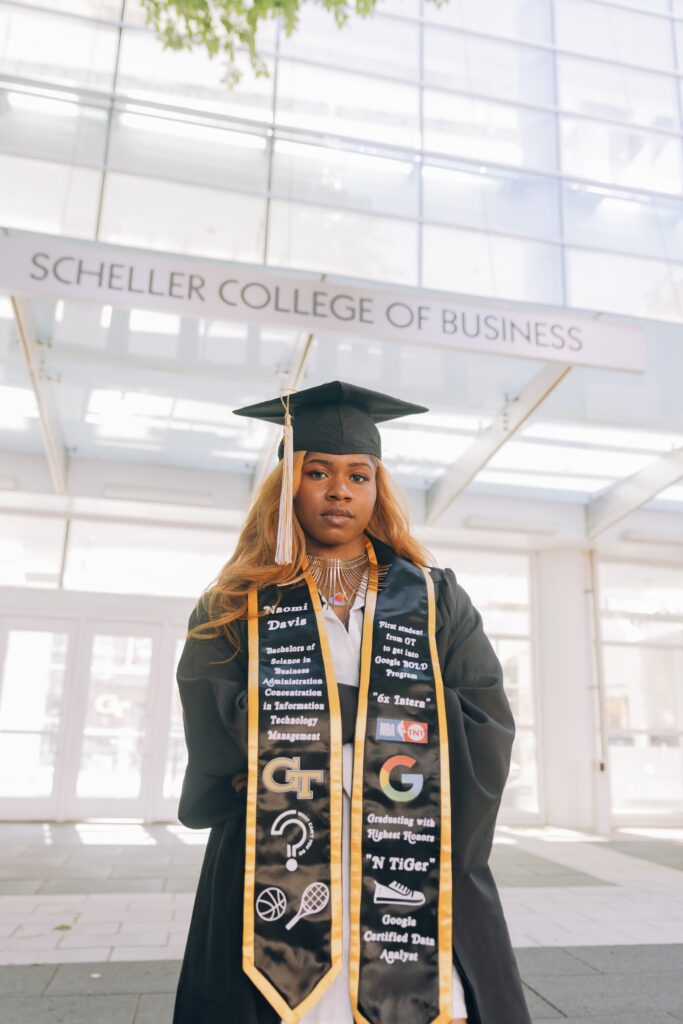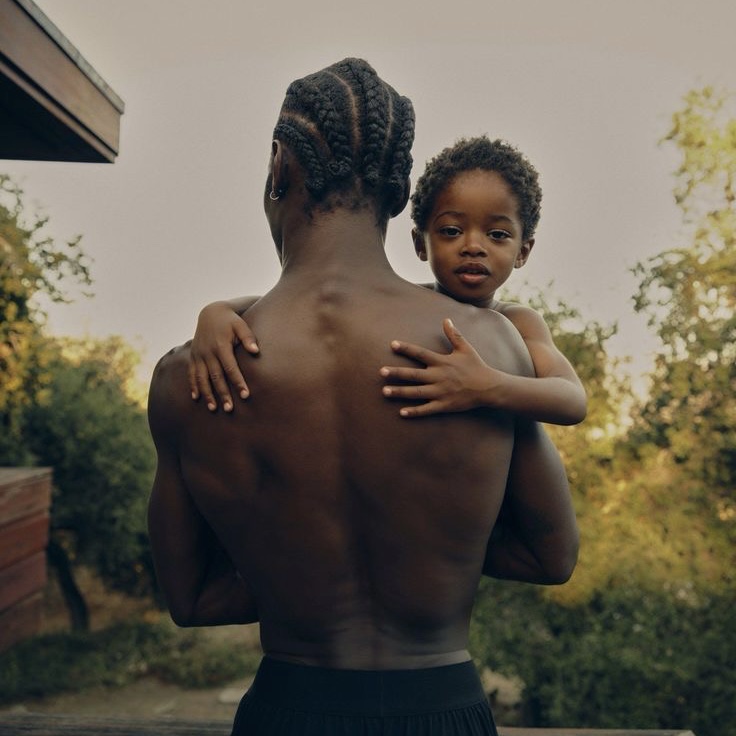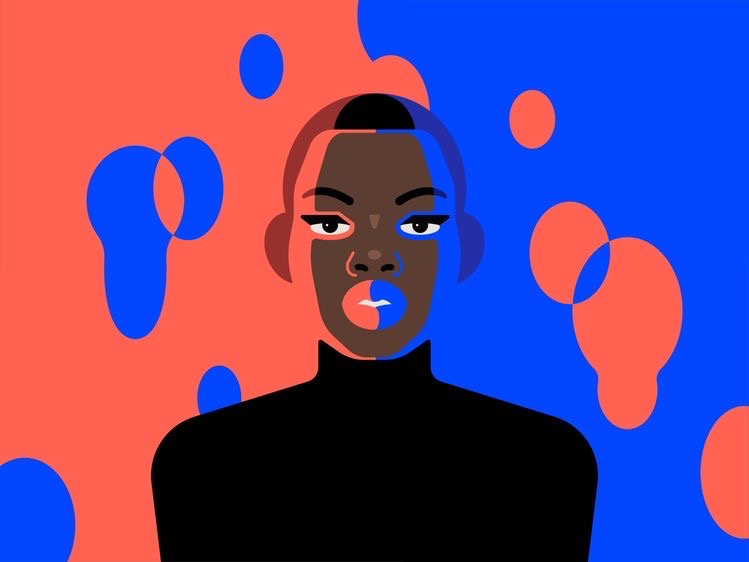NAOMI DAVIS: Hello?
CAYDEN BROWN: Hey, how are you?
NAOMI: I’m great. How are you? I’m good. I’m good. Thank you for calling.
NAOMI: Of course, of course. I’m excited.
CAYDEN: I am too! My goodness. First of all, tell these people who you are.
NAOMI: Well, I am Naomi Davis, a recent grad from Georgia Tech-
CAYDEN: With honors.

Haha, and yeah, that’s the very, very basic intro.
CAYDEN: Yes, yes. Well, I have been following you for quite some time now. When I reached out, it was a few months after I started following you, because I had just seen your drive. And I saw that you brought a different energy to the scene. And I liked it.
NAOMI: Of course.
CAYDEN: You know, so I knew I had to include you. Please tell us what you did at Google!
NAOMI: Yeah, of course. So I’ve had a long journey with Google too. So I mean, first it started off my sophomore year, I got into to their Google Bold Immersion program. So basically, it’s like a feeder program into the internship. And after a while, I found out that I was actually the first student from my school, ever, to get into this program. And like the acceptance rate was like one or 2%. It was, it was like, way less than Harvard or whatever. And so I was like, that’s crazy. And so this was a three week program, and it was virtual. And we just got to learn a lot about personal & professional development. And it’s all about Google in itself. So we got to like, we got like interview workshops, resume workshops, and a lot of like, personal development, like impostor syndrome, and it’s the session called ‘I am remarkable’ just like, you know, really appreciating yourself and appreciating all your accomplishments and being proud of yourself. So it was a great program. After that, I applied for the internship program. So that was the next summer. So summer 2022, I moved to Chicago for three months to work at Google, with their digital strategy team. And honestly, that was probably one of my best summers ever, like, honestly, in my life, just with everything that came with working at Google and, and being in a new new city by yourself. So like, I’m moved by myself, I was in a very nice penthouse. Shout out to Google.
CAYDEN: I know thats right.
[Both Laugh]
NAOMI: And it’s just like, you get to learn a lot about yourself when you’re in a new place, you know, you spend time with your thoughts. So I feel like that last summer was very transformative for me. And yeah, so about a month after my internship ended in August 2022, in September 2022, I got a full time offer to return to the same team. So I’ll be starting in August, this year, August 2023. We’re basically the same team. And I’m just very grateful, because it kind of felt like I had, because like with the feeder program that I got in my sophomore year, they’re basically saying, like, it’s kind of set up for you to you know, get the internship and to get a full time role. And knowing me, like you said, In the beginning, like my drive, I was like, I know my drive. And I know how to get through. So my sophomore year, I was like, Okay, so basically, you’re telling me I have a full time role.
CAYDEN: Right!
NAOMI: If I do if I do everything right, you’re telling me I have a full time role. And so that’s what was going through my mind. So I was just making sure you know, to put forth my best self, you know, be be hardworking and you know, networking is key. And then I ended up getting a full time role. And I was like my last year, my senior year was pretty chill, because I had that full time offer under my belt. And I’m just very grateful about that.
CAYDEN: That is amazing. I had no idea Google did that.
NAOMI: Yeah, it’s a blessing.
CAYDEN: Definitely. Well, you know why we’re here to talk, Naomi.
NAOMI: [Laughs]
CAYDEN: Because as beautiful as that sounds, I know that there was some struggles.
NAOMI: Oh, yeah, it was never easy!
[Both Laugh Hysterically]
CAYDEN: So that’s what we’re gonna get into. But once again, going back to your drive, like I really just noticed and I love seeing Black people who are smart, but still bring that swag to building. You now what I’m saying?
NAOMI: Thats the key!!!
CAYDEN: Thats the key. Like, the balance it’s crazy because a lot of times I either see, you know, somebody who’s kind of lost their seed—
NAOMI: Mhm.
CAYDEN: And forgot where they came from. And I like seeing people like you who can bring the intellect and the swag.
NAOMI: Yessir.
CAYDEN: Simultaneously. So, um, but yeah, so I really want to get into struggle because just simply being a Black student, is a struggle but then knowing that you are at the top of your class and knowing that you are smarter than most of the people you’re going to school with, yet being treated as if your dumb… A different story. Tell me how you navigated your first years in university?
NAOMI: Yeah, I mean, so being that I am a Black student, or I was a Black student at a PWI.
CAYDEN: HMMPH.
NAOMI: That was another thing in itself, being that probably the percentage of students was less than 10% Black. So I was going into that whole situation. Now, it’s grown in the past four years that I’ve been there. But when I came in, it was definitely less. It was probably like seven.
CAYDEN: And that’s a whole that’s a whole nother thing to unpack.
NAOMI: Yeah, yeah. That’s a whole nother problem. I feel like we can go on and on. But yeah, so that was another thing. So I mean, honestly, going into college, I already knew, you know, I already knew kind of about myself, like, I knew I was smart. And I was worthy of being there. Because I got in for a reason.
CAYDEN: Yes.
NAOMI: It’s not anything about them just trying to meet a quota. Like it’s not that. I never thought of myself as a quota. Or just them trying to get a number.
CAYDEN: Like they tryna check boxes.
NAOMI: Yeah. Some people know, I do know, I do have some friends. They’re like, “Yeah, I’m just here, because I’m trying to make-” like, no, no, no, this is what I try and tell my friends all the time, or at least just people around me is that you’re here for a reason. You got here for a reason. Don’t question it.
CAYDEN: Wow.
NAOMI: Yeah, so when I came in, I already had that in the back of my mind. And I’m pretty sure like maybe 90% of the courses or classes that I took at the university, I was probably the only Black person in class, or at max it was like one or two of us. So that’s another thing.
CAYDEN: Mm.
NAOMI: Being in class and being the only Black person in class, or honestly, being in class isn’t that bad, especially if it’s lecture because they’re just like, talking, but it’s really group projects, group projects is where those struggles come in. Because these are people your age, it’s not like people. I mean, these are like, like Caucasian or Asian students our age, these aren’t like older, older adults that like know or are quote unquote, woke, you know, woken up to know that they were born into prejudice, you know?
CAYDEN: MMM.
NAOMI: So in these groups, like, oh my gosh, I mean, I’ve run into so many group projects where like, people are not taking my ideas into, like effect-
CAYDEN: [Claps] Talk about that!
NAOMI: I will put out an opinion and then they’re just like, “okay, yeah, yeah. We’ll think about that.”
CAYDEN: Ugh. Too familiar.
NAOMI: And I’m like, You’re not, you’re just saying that just, you know, to go by, like you’re not listening. And that’s because, like, they don’t know who I am, they just see they just see like, I’m a Black woman in a group, like I didn’t play like the D1 one sports at tech, but like, I dress I, whenever I go to class, I dress comfortable. So like, I look like an athlete basically.
CAYDEN: Okay.
NAOMI: So they’re like, so they probably thought I was just an athlete, you know, not intellectual, and they didn’t really respect my opinions that much, especially now this was this was more in the freshman, sophomore year phase of my college career as, as I went throughout Georgia Tech, I kind of like made my name known. A lot of people knew me, especially because of the Google thing. A lot of people started, like respecting me more, because I started doing a lot more my name started going around. So I’m just speaking on freshman and sophomore year, was kind of just like, Okay, you’re not listening to me. I’m just trying to trying to get this this project done. Like-
CAYDEN: Naomi. I am so glad that you just brought that up.
NAOMI: Yeah.
CAYDEN: Because I was gonna wait till the end.
[Both Laugh]
CAYDEN: That’s so real. Because even now, I can’t imagine what it’s like in university full of kids who just think that they’re better.
NAOMI: Yeah!
CAYDEN: You know what I’m saying? Just naturally, they’re just, they’re just better than you just because.
NAOMI: Exactly, everybody at Georgia Tech was the number one at their school or before. So everybody thinks-
CAYDEN: Wow. And like, I, I always use my honors english class as an example of this. Any idea that we bring to the table is not smart if it didn’t come from their brain?
NAOMI: Yes. It’s insane.
CAYDEN: Just because it came out of my mouth. It’s not smart. But I’m in my honors english class, I’ll say something-And here’s the catch- I’ll even say it in a more profound way.
NAOMI: Right.
CAYDEN: I’ll even say it the grammatically correct way, or the way that I would say it in a business meeting with Barack Obama.
NAOMI: Right. [Laughs]
CAYDEN: I would say, you know, I’d say it in these types of formal ways. And they’d be like, “Oh,” like you said, “Oh, okay. Yeah, that’s cute.” And then somebody else will say it in layman’s terms! And everybody- it’s a standing ovation in the classroom!
NAOMI: Oh, my gosh! Yeah, I’ve definitely experienced that, too. Where I’ll say something, somebody will be saying the exact same thing that I said, and they’ll get more credit for it.
CAYDEN: Why do you think that is? Even though I know the answer. [Laughs]
NAOMI: They don’t want to give you credit! That’s just simple. Like, they don’t want to give you credit. They want to take it for them.
CAYDEN: Absolutely. My thing is, though, is don’t paint me out to be angry and make it seem like I’m attacking you because I finally spoke up and said, “Hey, that was my idea.” And now I’m crazy.
NAOMI: Yeah! And that’s something that I kind of struggle with. I don’t think I had any trauma about about like being called angry or mad because I don’t think I’ve ever- I’m pretty calm in situations. But there are situations where I could have like, stood up for myself, but I just didn’t because like, it’s just too much drama that comes with that. Like, I feel like I feel like a lot of people are closed minded anyway, so if I try and bring up what just happened, or, or the background of what just happened, like, what you’re what you’re talking about, then it’s gonna be like people are gonna try and like gaslight, like, “I don’t know what you’re talking about. I’m not I’m not trying to be prejudiced,” Blah blah blah blah. So I just don’t have time to deal with close minded people. So sometimes, like, I don’t know, I’ve learned that being quiet in some situations, where but like, in a lot of situations, you definitely have to speak up for yourself.
CAYDEN: I feel that. I feel like though, I understand what you were saying about like not wanting your words to fall on deaf ears. You know, but I feel like that’s become apart of everyday life of being Black, you’re always having to explain yourself you always have-
NAOMI: OH MY GOSH. I hate explaining myself like, I mean, like in certain situations, I really hate having to explain myself in depth every time like something happens.
CAYDEN: Oh, my thing is that’s why because it’s not that I don’t like explaining myself. I don’t like explaining things that are obvious
NAOMI: RIGHT! That’s what I’m trying to say!
CAYDEN: Right like, why am I explaining to you how you stealing my idea out of my mouth and then taking the credit is unacceptable?
NAOMI: [Laughs] Exactly! Like, why am I explaining this to you?
CAYDEN: It’s just too much.
NAOMI: Yeah, it is.
CAYDEN: It’s toxic. And it makes it very hard to want to continue. And I think that’s the point. I think the point is, for them to rally together to try to get us to eliminate ourselves. You know what I’m saying? Because they CAN’T COMPETE. You get what I’m saying. So when I see that you’re doing these big things, and they can’t compete with you academically, they try to get in your head.
NAOMI: Oh, yeah, They always- I’ve always seen a one up.
CAYDEN: Mmm.
NAOMI: Or people trying to one up, especially like ever since I got the Google thing. And my name started going around campus like this that and the third, like, whenever conversations come up, I always get a comment trying to one up me like-
CAYDEN: [Laughs Hysterically]
like, especially like, so I play tennis and I play with like, older white- Like for my opponents. I play with older white women. And when I tell them like yeah, I’m about to graduate, Georgia Tech, and I’m getting it. I got into Google blazablah, they be like “Oh, yeah. My daughter goes to Georgia Tech. She’s a double major. This, that that, yeah she got, she’s got to work for Microsoft. Blah, blah” I didnt ask for for that!
CAYDEN: Nobody did!
NAOMI: I didn’t ask for that. Like, you can’t just say good job and go ahead?
CAYDEN: Man! That’s no, that’s never even-
NAOMI: It’s not even like they’re trying to relate or anything. I can tell from the tone that they are just trying to one up.
CAYDEN: Absolutely. You can tell. You can tell! Um, that’s definitely something I’ve had to become used to recently. Like people just like- nobody can just shake my hand and say congratulations and keep it pushing.
NAOMI: Right.
CAYDEN: It’s either them trying to one up me or if they don’t have nothing to one up me with, they’re trying to minimize what I’m doing.
NAOMI: Yeah. And I’m not saying this is everybody, either. It’s not like I run into this on a daily basis.
CAYDEN: No!
NAOMI: It’s just a select group of people that think like this, because of course, I’ve run into so many, you know, people that are just like, you know, congrats.
CAYDEN: Right! Right right.
NAOMI: It’s really just that that little corner.
CAYDEN: Yup.
NAOMI: That just- It’s really jealousy. Jealousy hurts!
CAYDEN: Man! It’s a disease. Die slow.
NAOMI: Yeah. [Laughs]
CAYDEN: Yeah. Yeah. I want to talk about- because now we done covered all the classes. Um, tell me about what your relationships were like, with your professors. Did they give you trouble? You know, like, did they make it- Because here’s my experience is I’ve had teachers that will grade the sloppiest mess of work by an other. That’s what I’m gonna call them. [Laughs]
NAOMI: Nice. I like that word. I’m actually going to use that from now on.
CAYDEN: Yeah!
NAOMI: I really liked it! [Laughs]
CAYDEN: An other because it doesn’t specify. It’s somebody else that doesn’t look like me. And they’ll get A’s and B’s might see a C if it was really all, you know, but my work. They’re so critical. In fact, when like I said earlier, I was using overly profound language. And was speaking like it was an honors class- ’cause we are honors English.
NAOMI: [Laughs]
CAYDEN: “It’s too wordy. It’s, you know, I don’t understand it.” But again, layman’s terms, anything simply said is just wonderful. And it’s, it’s an A plus. I don’t like the undermining that teachers do, publicly, to make you feel that you are not as smart as somebody else or can’t produce the same quality of work.
NAOMI: I hate that. I do hate that. Honestly, my experience at Georgia Tech- okay, one I’m gonna be honest, I didn’t really have a lot of relationship In general, were my professors. I just went to class, did my work, and got out the class like, I didn’t really like, get close to professors. I’ve probably been a one office hour, I’m gonna be honest, I probably only been a one office hour. I’m just here to do my work, graduate, whatever. I did make some good relationships with with a handful of professors. But most of the time I just went to the class did the work. But I will say out of all of my experiences, I did run into one situation. But as it was with a TA, with a teacher assistant, not with the professor. So but they we had it was this was actually lit class. So, like literature class. So we had to write up a response about something- I don’t ever remember, this had to be like, sophomore year. And so I wrote a response about Black Lives Matter. This was around that time.
CAYDEN: Yes, it was relevant.
NAOMI: Guess what this- She said, I don’t know. She was basically like, this paragraph is too personal.
CAYDEN: MAN. They do that all the time.
NAOMI: She said, “It’s too personal.” She told me to resubmit the assignment. Because my response was too personal. I’M BEING REAL.
CAYDEN: Right! They don’t like that.
NAOMI: Like, that shook me like that, because I never really I never really ran into something like that. Like with the professor or with their TA or anything, like, usually my feedback is pretty straightforward. But this was the first time where I got something that was pretty iffy. Like, wait, what?
CAYDEN: Right. Well, you know, that means that you wrote it right.
NAOMI: Right!
CAYDEN: Because it made her feel uncomfortable. And that’s part of the problem. As soon as people feel uncomfortable about exposing something they know that they benefit from…
NAOMI: What he said.
CAYDEN: What about when you started entering the workforce?
NAOMI: Okay, okay.
CAYDEN: Yeah, we don’t take this one step by step.
NAOMI: I will say I’ve had seven internships.
CAYDEN: Wow. In four years?
NAOMI: Yeah. Yeah. I’ll say, now that I’ve had some internships, I mean, there are some companies that will treat you like an intern. There are some companies that will treat you like a person.
CAYDEN: Ha! I was hoping you were gonna say, human/person. Yeah.
NAOMI: I mean, yeah. Like, like, I’ll say, I don’t want to okay, but internship that I’m working now, who cares? I’m being treated like an intern. Like, that’s just how the program is set up. And they just like, I’m not doing any meaningful work. Like, I’m just sitting, going to meetings. That’s, that’s it. And then there’s probably like one other are two other Black people on the team that I’m working with. Anyway, so it was kind of like, it’s weird, especially when I go into office, and we have meetings. So in those meeting rooms, like I’m like, the only Black person, it’s just like, Those situations are kind of weird. I mean, I can I can follow up with you in a few months when I actually start my full time role. But I just feel like people in general, they just treat interns kind of just like, you know, Are you just the entire you’re not really doing much, you know, you’re just here to do a small project this and then third. I was at Google, I did a lot of meaningful work. So shout out to Google. And also shout out to Warner Bros. Discovery. Those are my two favorite internships, did meaningful work. Really important work actually. Got to meet a lot of people who actually like, listened to what I said, that listened to my opinions. So shout out to Google and Warner Bros. Discovery.
CAYDEN: Big names, y’all hear? That’s amazing. Well, the last thing I want to ask you about is because I’ve heard you mentioned multiple times. The ratio of Black people and others.
NAOMI: Yes.
CAYDEN: And so, I want to talk to you about, one, Did you notice any animosity between you and the other Black people? Or was it, you know, an instant click?
NAOMI: Oh, I’m cool with every- okay, so that’s really like this internship that I’m in right now is really a good example. Because it is kind of that weird ratio, where once you see a Black person, you’re gonna say what’s up, because it’s not a lot of us around here. So when I went to my Intern Orientation, I saw that I saw the ratio, I saw that it wasn’t a lot of us. Like, I just saw that. And I saw three Black girls sitting together. And I went up to them, and I sat down, and I was like, “hey, wassup y’all?” And she was like, “What’s up?” and we just clicked, like, right there.
CAYDEN: Good!
NAOMI: I’ll be honest, when I go to events, or whether that’s whether that was in university, or whether that’s in the workforce, I do tend to talk to the to the Black people first and make a relationship with them first, and then, you know, go to the others, because I feel like it’s like, it’s a, I have to have that community aspect, first with my community, and then go out with the others, like we had a happy hour, the other day, and you it’s just I don’t know, it feels so segregated sometimes. Like you see all the Black interns over here, all the others over there. And then towards the end of the event, then everybody’s mixing and mingling. So I mean, it’s definitely something that I honestly, I need to work on. But like, I enjoy all the connections that I make connections with everybody. Blacks, others, whatever, I make connections with everybody. But African Americans like in the same space that I’m in they’re priority first.
CAYDEN: That is so crazy that you took exactly what my next follow up question was gonna be. I was going to ask about how you feel about self-segregation. Making sure you know what I’m saying, like making sure you touch home base first, you know what I’m saying? And then you can go experiment, because a lot of times, I feel like when Black people enter the workforce, and I have another interview about this in 20 minutes. But when we enter the workforce, we feel like we’re the only ones ,you know, like, we’re lonely in that. And so we’re looking around like, dang, like, there’s just me here, blah, blah, blah. So when you do finally find someone, you’re going to naturally gravitate towards them because y’all already have a historical connection. You know what I’m saying?
NAOMI: 100% That’s how it is. 100% because, like, I don’t, I mean, you have something to relate to. I think that’s just any type of relationship, any type of friendship or relationship. If you have something to relate to then you know, that’s the that’s the start of a relationship. So, yeah, I mean, it’s, it’s true, like I was, I was on a basketball team. I was on the club basketball team at Georgia Tech, and it was mostly like, others, and it was probably like two or three Black girls.
CAYDEN: You picked up that word ‘others’ quick!
NAOMI: Oh, yeah.
[Both Laugh]
CAYDEN: You integrate that so seamlessly.
NAOMI: I love that. So I mean, when I have conversations with with my other teammates, then I’m just like, “wait, what do you talk-” Like, No, we don’t have the same experiences. But when I, when I’m talking to the other Black girls on the team, like we just we just kickin it and vibin’ and stuff like that because we saying, “Oh yeah, same girl, same here or whatever.” Like, it’s just, I mean, it’s just different. You just got to touch bases.
CAYDEN: I feel it. Aye, I think it is important though, to make sure- ‘cause this is Trespass- so we need to make sure we’re not just staying on one side of the fence, right?
NAOMI: It’s a game. You gotta play the game.

CAYDEN: I think it’s important to touch home base first. Heavy on the word ‘first’, though. ‘Cause that means you can take ya whole posse with you when you cross the fence.
NAOMI: Mhm!
CAYDEN: You know what I’m saying? Instead of jumping over the fence and being attacked.
NAOMI: Yup. Exactly. You touch home base then you do what you gotta do afterwards.
CAYDEN: Then you home run it! Well, this was a great conversation.
NAOMI: I had fun! I always love talking about these topics because it’s real, continuing and should be an ongoing conversation.
CAYDEN: Absolutely. Thank you so much for joining me. Your input was highly appreciated.
NAOMI: Yeah. Bravo. I’m excited to see what comes out. I’m willing to do whatever to promote, just let me know.
CAYDEN: Thank you. Keep me updated on these internships, keep going. You’re insane!
NAOMI: Ofcourse, Thank you! Enjoy the rest of your night and your next interview and I’m super excited to see the final product.
CAYDEN: Ah, I appreciate that. Same to you, we’ll keep in touch.
NAOMI: Alright. Thank you.
CAYDEN: Absolutely, bye bye.
Related Posts



